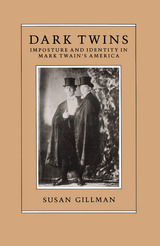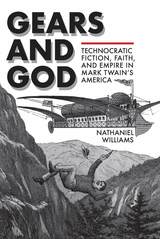
Gillman shows that laws regulating race classification, paternity, and rape cases underwrite Twain's critical exploration of racial and sexual difference in the writings of the 1890s and after, most strikingly in the little-known manuscripts that Gillman calls the "tales of transvestism." The "pseudoscience" of spiritualism and the "science" of psychology provide the cultural vocabularies essential to Twain's fantasy and science fiction writings of his last two decades. Twain stands forth finally as a representative man, not only a child of his culture, but also as one implicated in a continuing American anxiety about freedom, race, and identity.

In Gears and God: Technocratic Fiction, Faith, and Empire in Mark Twain’s America, Nathaniel Williams analyzes the genre of technology-themed exploration novels—dime novel adventure stories featuring steam-powered and electrified robots, airships, and submersibles. This genre proliferated during the same cultural moment when evolutionary science was dismantling Americans’ prevailing, biblically based understanding of human history.
While their heyday occurred in the late 1800s, technocratic adventure novels like Twain’s A Connecticut Yankee in King Arthur’s Court inspired later fiction about science and technology. Similar to the science fiction plotlines of writers like Jules Verne and H. Rider Haggard, and anticipating the adventures of Tom Swift some decades later, these novels feature Americans using technology to visit and seize control of remote locales, a trait that has led many scholars to view them primarily as protoimperialist narratives. Their legacy, however, is more complicated. As they grew in popularity, such works became as concerned with the preservation of a fraught Anglo-Protestant American identity as they were with spreading that identity across the globe.
Many of these novels frequently assert the Bible’s authority as a historical source. Collectively, such stories popularized the notion that technology and travel might essentially “prove” the Bible’s veracity—a message that continues to be deployed in contemporary debates over intelligent design, the teaching of evolution in public schools, and in reality TV shows that seek historical evidence for biblical events. Williams argues that these fictions performed significant cultural work, and he consolidates evidence from the novels themselves, as well as news articles, sermons, and other sources of the era, outlining and mapping the development of technocratic fiction.

Something is not right in the world of Tom Sawyer and Huckleberry Finn. The unease is less evident to Tom, the manipulator, than to the socially marginal Huck. The trouble is most dramatically revealed when Huck, whose “sivilized” Christian conscience is developing, faces the choice between betraying his black friend Jim—which he believes is his moral duty—and letting him escape, as his heart tells him to do.
“Bad faith” is Forrest Robinson's name for the dissonance between what we profess to believe, how we act, and how we interpret our own behavior. There is bad faith in the small hypocrisies of daily living, but Robinson has a much graver issue in mind—namely slavery, which persisted for nearly a century in a Christian republic founded on ideals of freedom, equality, and justice. Huck, living on the fringes of small-town society, recognizes Jim's humanity and understands the desperateness of his plight. Yet Huck is white, a member of the dominant class; he is at once influenced and bewildered by the contradictions of bad faith in the minds of his fully acculturated contemporaries.
Robinson stresses that “bad faith” is more than a theme with Mark Twain; his bleak view of man's social nature (however humorously expressed), his nostalgia, his ambivalence about the South, his complex relationship to his audience, can all be traced back to an awareness of the deceits at the core of his culture—and he is not himself immune. This deeply perceptive book will be of interest to students of American literature and history and to anyone concerned with moral issues.
READERS
Browse our collection.
PUBLISHERS
See BiblioVault's publisher services.
STUDENT SERVICES
Files for college accessibility offices.
UChicago Accessibility Resources
home | accessibility | search | about | contact us
BiblioVault ® 2001 - 2024
The University of Chicago Press









